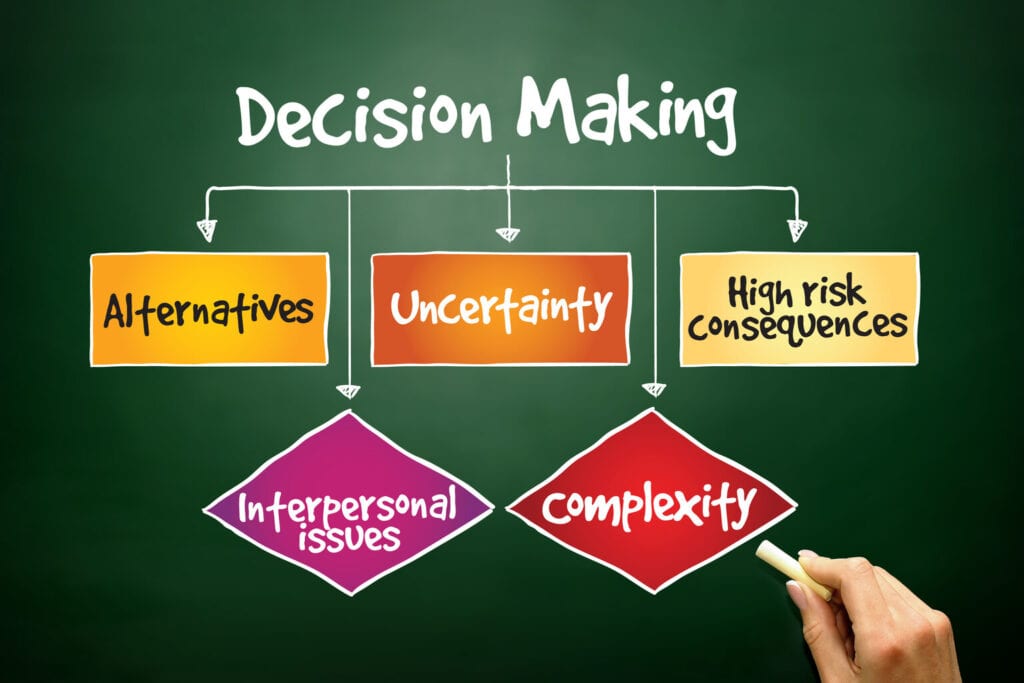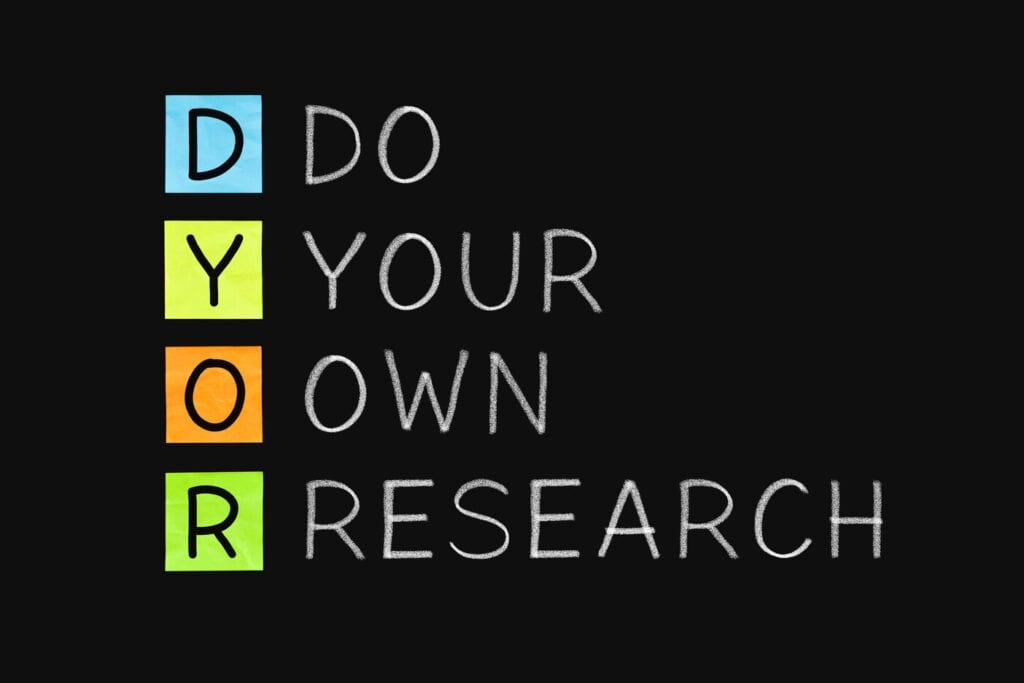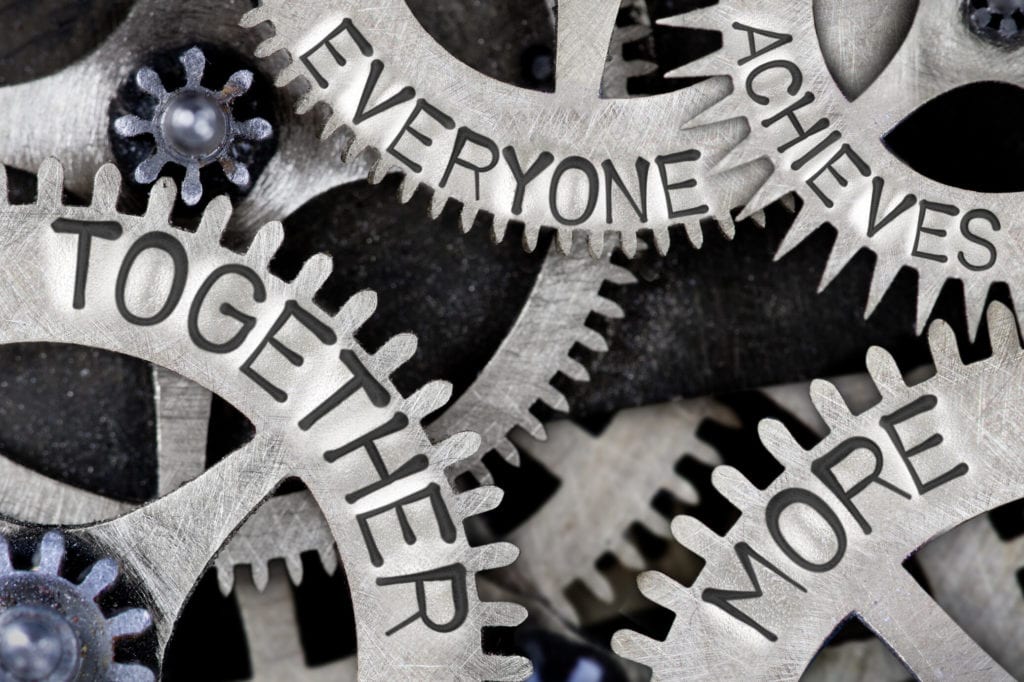Psychology
11 Ways on How to Make an Effective Decision
We make a ton of decisions in our lifetime. The challenge we face as humans is whether we are making the right decision or not. The fact about decisions is that once we make them, we set in motion a chain of events that begins to steamroll like a bullet train. The essence of this piece is to help us hone the art of effective decision-making. Please, read all about it!


Decision-making is a robust thought process. Every moment of the day, we make tons of decisions. Some decisions we make are inconsequential, and some others life-changing. Whatever the outcome of our decisions is, our optimum target is for a positive result. Therefore, we always want to make sure that we come out top in all the decisions we make. That is the essence of this piece, to help us hone the art of our effective decision-making skills.
“A journey of a thousand miles begins with a single step.” — Lao Tzu.
As powerful as decisions are, they are not always that easy to arrive at, which is why you want to make sure you go about it the right way. We want to make sure we get our decisions right; hence, the need for effective decision-making. Making effective decisions starts with taking the first step, just like Lao Tzu said in the quotation above.


Every inspiration, idea, achievement was born out of a decision. Every step you take towards making that decision counts. You must filter through alternatives, go through the smog of uncertainties, complexities, interpersonal issues, and high-risk consequences to get to the right decision. More so, the truth in itself is that not making the decision is a decision itself. So, would you rather choose not to make the decision or start from somewhere? Your guess is as good as mine; it is better to start somewhere. That is why I have listed thorough steps to take to ensure you make effective decisions.
11 Ways of Effective Decision-Making


It is important to note that we are accountable for the product of our decisions and so must bear the consequences that will come with it, hence why we mustn’t make hasty decisions. Making effective decisions requires tact. We can adopt various ways to ensure that we arrive at the right decision, for the right moment and the right occasion. Lets’ look at some of the ways to help you arrive at a practical conclusion. Let’s go:
#1. Think It Through


Most times, we make decisions without even thinking about what we are deciding on or the outcome, which is alright, all things being equal. But when it comes to a huge life-changing decision, you want to take your time to think about it. By thinking about it, you are weighing your options. You are deciding whether there are other alternatives or ways to go about the situation at hand. Also, you need to figure out the pros and cons and measure out which one has more benefits.
Thinking it through allows you to determine the impact your final decision will have on your future and in the life of those around you. Some people say decide on it quickly to get it over and done with and not lag on the decision process. However, I say that you should think about it thoroughly. Thinking it through so will lead to a more satisfactory outcome. The act of thinking it through an issue could evolve over days, weeks, months, or even through a couple of years.
#2. Sleep It Through


Hmm! Am pretty sure you are wondering why you must sleep through the thought before making that decision. I bet you are also wondering about the difference between this and thinking it through. The fact is that the beauty of sleeping it through lies in the quietness of your mind. We process information better when our mind is at its optimum silence. That era of peace allows our minds to search for answers by connecting deeply with our subconscious state.
Sleeping it through doesn’t have to last that long. It may be a night or two that does the deal in ushering you to the compelling solution you seek. It may even be for a couple of hours during a siesta—a moment during the day when you take a break, and your mind is in a perfect halcyon state. Then, you will wake up and find that you have an answer as to why you decide on ‘A’ over ‘B’ options. What I love most about this process is that your decision comes from a natural state.
#3. Seek Another Opinion


When you are not sure, always ask for other people’s opinions. Doing so will help affirm what your instinct is telling you and will surely help you to go ahead and make a firm decision. Sometimes, when we seek the proper counsel from the right people, we gain a cartload of wisdom from the tacit knowledge experience of the people we are consulting. Maybe, they have had the privilege of going through that particular situation that we are inquiring about and currently going through. Hence, we learn from their experience and then make an effective decision from there.
Seeking another opinion does not require you to call a crowd into the matter. It could be one or two persons that could help give you some insight into the issue. However, in some cases, three could help confirm your decision, especially if everything they are saying is in perfect synchrony. It could be a family member, friend, specialist, or higher authority in the area you seek insight into. The wisdom you gain seeking an opinion from others can allow you to make an effective decision.
#4. Your Value-Based


Sometimes, going with your gut instinct could be the key to making a practical decision. The fact is that your instincts align with your values and is most of the time correct. In “What Influences Your Decisions,” I mentioned that “What you highly believe in is what would drive your decisions and decisions built on your value system is very likely to be the best decisions you make.”
Sometimes you may not have the time to weigh the pros and cons or even have the time to sleep over it. In these instances, many concomitant actions may be hanging on you making that effective decision, especially if you are in a leadership role. Such a time is when you have a strong bias for action, and you are required to decide on the fly. So, let your value-based gut instinct do the work for you in such instances; you become a confident decision-maker by so doing.
#5. DYOR


The acronym stands for Do Your Own Research (DYOR). You’ve thought about it; you asked other people for their opinion on the matter; the next step is investing time and conducting some research. Yes, we said your value-based system/gut-feeling or intuition could be right most of the time. However, the fact is that we live in a world that is constantly evolving world and changing. There is a constant update to policies and laws regularly. You might land yourself in a wrong decision if you don’t take out time to do your own research.
Assuming you want to apply to a university to do a pharmacy course and perhaps your friend got into the same university the previous year. From then till now, things may have changed in the institution. So, without doing some of your current research, you may not be aware of some recent changes that the university has taken on that same course which may not favor you. So, it is essential to do your due diligence! Put in the time and do your research in other to make an effective decision.
#6. Digest It


“Digest it!” That’s right, “Digest it!” Ruminate over it. The digestion stage is the question or the waiting stage. After you’ve thought about it, slept through it, inquired from others, did your research, and you know what your instinct is telling you. Now, it is time to ask yourself if it feels right. If you are about to do the right thing? If it does feel right, then go ahead. Give yourself the green light to make an effective decision.
#7. Put Your Emotions Aside


Our emotions are an integral part of our decision-making process. The fact is that we don’t make the best decisions when our emotions are at play. Emotions affect our thinking and tend to motivate us to act quickly. However, in such a state, we may make rash decisions that don’t augur well at the end of the day. Have you ever decided on something in an emotional state of anger? If you have, I am sure you did later regret that decision, right?
As weird as it may sound, there are times that we also regret decisions that we make out of good emotions. For instance, if you bought that dress because you were feeling happy on that day. But later, due to buyer’s remorse, you now regret your actions because you now think that could put the money to better use on more critical needs. That’s how powerful our emotions come into play, so it is best to put them aside when you are about to decide on something big or small.
#8. Identify the Risks Involved


Acknowledging the risks involved before you decide will help you create a plan to mitigate those risks. One good factor about identifying the dangers is that it allows you to focus less on the consequences. Let’s face it—every decision you make will either make you happy or sad, but fearing those consequences will only push you farther away from making any decision at all. Nevertheless, you can mitigate the effects of ensuing risks via an effective risk management plan when you identify them earlier.
Developing a risk management plan consists of the following steps-identify, analyze, evaluate, and action. First, you must identify the risks involved. Second, analyze your options. Third, evaluate and plan out your strategy of attack. Fourth, act on your choices. By carrying out the steps of your risk management plan, you will make an effective decision in the long haul. Likewise, you can also eschew these risks with a creative project plan.
#9. Visualize Your Achievement Daily


There is power in visualization. Constantly picture in your mind how you will look once you’ve attained your set goal. For example, if you have ever dreamed of owning a coffee shop while putting in all the necessary efforts to set up your business or even still saving up some capital to commence the project, daily picture yourself in your shop. Picture yourself wearing your barista apron. Visualize yourself greeting your customers. Imagine yourself checking them out at the register. There is power in visualization.
The exercise may seem banal at best; however, in the words of Ogbonnaya Agom-Eze, “What you picture in your mind’s eye permeates the fabrics of the universe to become your reality.” This simple exercise increases your motivation and helps to keep you focused on your goal. The activity above also enables you to visualize pending decisions. It also allows you to weigh options on tackling those decisions when they become due. Imagining your achievements will let you make more effective decisions.
#10. Dedicated Effort


Decision-making without dedicating effort to achieve is a waste. Instead, do something every day that will bring you closer to your goal. For example, if you have decided to open a coffee shop, as I said earlier in an instance above, you need to take a step every day towards achieving that goal or dream. If the effort you are putting in is not working out the way you planned, then change your strategy until you reach the result you want. Every effort counts—so take action!
One more thing, in the process of putting effort to make effective decisions that will bring you closer to your goals, always remember Pareto’s Law. It states that “roughly 80% of the results come from 20% of the efforts.” As much as you can apply this law in a larger corporate setting, you can also apply it to yourself in the swat of your effective decision-making skills. Technically, via Pareto’s Law, “80% of your decision results come from 20% of the sum of all decisions you make that are effective.” Do you agree? I would like to hear your opinions in the comment section.
#11. Stay Committed


When you have finally arrived at a decision, you need to stay committed to it as you don’t want all your effort to waste. It is not enough to say, “I will lose ten pounds in three months.” Yet, you walk past the treadmill in your loft every day. Or you drink all the sodas that the store has to offer. You cannot say, ‘I will write a novel before I turn thirty,” and yet you cannot write the first line of your story plot. Or ‘I will own a coffee shop,” and yet you are doing nothing to actualize that dream.
For a decision to be effective and successful, there is a need for total commitment. Effective decision-making requires total commitment. It would be best if you were all in when you make that decision to see it through from the cradle to the grave. Total commitment is a requirement to ensure that decision-making becomes effectual. It is the carabiner that connects effective decision-making to the success that ensues from making such choices. But, then, you must stick with it, persevering while working to make sure it pans out to be successful.


We make a ton of decisions daily. The essence of this piece is to ensure that we hone our skills in the art of effective decision-making, which, to be honest, can be challenging at times. Effective decision-making is the sprockets that answer the questions of who, what, when, why, where, and why? For our decisions to be effective, what do we do? First, we saw that we need to think the process through. Second, we need to sleep it through and make our choices in a calm state of mind. Third, we can seek the opinion of others. Fourth, we can make effective decisions via our gut instincts. Fifth, we need to do our due diligence by doing our research.
“The risk of a wrong decision is preferable to the terror of indecision.” — Maimonides.
Sixth, digest it—take your time to contemplate over it repetitively before committing to a choice. In the words of Muhammad Ali Jinnah, the Founder of Pakistan, “Think 100 times before you take a decision, but once that decision is taken, stand by it as one man.” The “thinking” is the digestion process. Seventh, put your emotions aside and then decide. Eighth, identify the risks involved—develop a plan to mitigate or eschew them. Ninth, visualize your achievement daily—that will channel your decisions towards your dreams. Tenth, put in your very best effort when you commit to a choice. Finally, stay the course after you commit to a decision. Do these, and you will be on the right path towards making effective decisions.
Psychology
What Influences Your Decisions?
We are forever under pressure with various instances of where we need to make a decision. However, the questions are, “What influences your decisions?” What factors nudge you to deliberately make a spontaneous move to pursue a particular line of action?” Please read all about it and find out some of the answers to these questions.


Decisions, decisions, decisions!!! In our daily life, from the moment we wake up till bedtime, we are constantly making decisions. We perpetually knacker ourselves with the questions, ‘Should I, or should I not?’ What to choose, what not to choose. How to choose and how not to. But how many decisions do you think you make daily? Well, I guess a lot for which we are not even aware of, to say the very least.
“You can’t make decisions based on fear and the possibility of what might happen.” ― Michelle Obama.
I have made quite a lot already today. When I woke up, I decided whether to do my daily workout or skip it today. After all, I’ve been excellent at it and consistent at keeping fit. What to wear, type of cereal I should have for breakfast. While having my breakfast am already thinking of lunch for the kids. Before I continued writing on this article, I also had to decide whether I should read first or write or check my emails and make some calls, and the list goes on and on. Decisions, decisions, decisions, and more decisions!!!


We make a Herculean load of decisions a day. Reading the article, “35,000 Decisions: The Great Choices of Strategic Leaders,” on the Leading Edge section of the Roberts Wesleyan College website2 is a great eye-opener. In one study that he cites, he establishes that “an adult makes on average about 35,000 decisions each day, while a child makes about 3,000 decisions per day.”3 The information from this study is nothing but mind-blowing. In another study he cites, he establishes that “we make 226.7 decisions each day on just what we eat alone, per researchers at Cornell University.”4
The type of decisions we make determines the approach or process that we implement. Depending on the kind of decisions we ought to make—some of which are pretty straightforward and some a bit more complex—the approach we implement can range from simple to deep thought approaches, which will result in either good or bad decisions. Furthermore, the decisions we make vary from personal decisions, career choices, leisure decisions, education decisions, political decisions, faith-based decisions, financial decisions, medical decisions, and so many others.1


While we are busy doing things that we love, the things that matter to us, and the things that stipulate our purpose (i.e., our calling, our why for, etc.), our mind or psyche is busy searching for answers to the questions we always ask ourselves. But how we finally arrive at a particular solution is what we often overlook. As human beings, we have the natural tuning to pick and choose what will work best. Hence, in this article, we will look at some contributing factors to our decision-making process. Let’s dig into them below:
#1. Personal Values


Your values are the core motivating factor in your decision-making process. They are an intrinsic part of our lives and therefore support our thoughts and decisions, and actions. Our values portray who we are, the standard of life we want to live, and how we want to live. If you are a Christian, most of your decisions and actions will be based on your Christian faith, as it is the primary driver of your values and beliefs.
Decision-making requires that you use your value-based system regardless of how it worked for someone else. The way you discipline your child will have a firm footing on your values rather than how your friend disciplines their child; thus, it spawns from a personal attribute. What you highly believe in is what would drive your decisions. Decisions sitting on the foundations of your value system are very likely to be the best decisions you will ever make.
#2. Your Childhood Experiences


There is no denying that our upbringing plays a huge part in our decision-making process because it helps to form and shape our beliefs, and this is due to both actions and words used during the child’s formative years. When growing up, you would remember some words said to you by your family, friends, and even teachers. Some or all of these words have come to impact your life. Some of these words have also helped you in your decision-making process.
Our mind is indeed a processing unit. Whatever experiences that we experience in this life go into the storage units of our compartmentalized minds. Sometimes, it may seem like we have forgotten some of these experiences. However, they lay buried in the depths of our subliminal self. It often replays our childhood experiences to us. These thoughts are often the product of triggers that come from sounds, sights, feelings, taste, and scents.


How then does it help us in making decisions? Let’s use taste as an example here. As an adult, you sometimes remember how sweet your mom or gran’s cake tasted as a kid. Or the taste of your most agreeable dish as a child, and you long to have it again. As they might not be near to make it for you, you decide to give it a try and bake it yourself. Of course, off you went and baked, “Hooray!!!” It may not have turned out with the same childhood taste, but at least, the thought of it prompted you to bake. That is the potent power of your childhood experience in action.
Each of our childhood experiences is different. Some people grew up in homes that are very regimented or disciplined. Others grew up in homes where there were constant disagreements and where you had arguments for breakfast, lunch, and dinner. Simultaneously, others come from a home that is open, participative, and welcomes dialogue. Whatever spectrum you find yourself in has a significant influence on our decision-making process and impacts our relationships with ourselves and others.


I want to point out here that children are like sponges. They soak up what they see and hear while growing up. Thus, parents or couples with children must be careful of how they relate with each other because whatever they are saying or doing is sinking into the subconscious of their wards. The Editor-in-Chief of Oaekpost wrote a great piece titled “Let’s Raise Our Children Right.” Let’s do just that, “Let’s raise our children right by acting right.”
Hence, if your childhood upbringing spawns from an environment where you repetitively heard hurtful words, such an experience can also lead to poor decision-making later on in life. Such incidents could cause you to have flashbacks. These are the “recurrent and abnormally vivid recollection of a traumatic experience, as a battle, sometimes accompanied by hallucinations.” These negative thoughts become seared to the minds of children. It scars them and becomes a scab of their undoing when it comes to decision-making as they grow up. Which then takes us to the next point—Memories.
#3. Memories


Memories sprout from experiences we have in life, and these are also very personal to us. Because memories are pretty subjective, it allows us to create our moral beliefs through repetition. Its repetitive nature teaches us how to interact with the world around us, which, in turn, aids in our decision-making process. Because memories are an essential factor that influences our decision-making, it supports positive behavior and offers negative consequences. A child who has gone through the consequences of disobedience will have a robust decision-making will to avoid similar life occurrences later on in life. Repetition is the key here—it helps us to consolidate these memories in our minds. The more we do it, the more it is stored in our memory.
I guess the question then is what makes our mind travel back and pull out those memories? Emotions! Yes, emotions are one of the best triggers of our memory and work exceptionally well in taking us on the journey of remembrance down memory lane. The feelings we took out of past experiences, either good or bad, determine how we react when similar situations occur. You probably won’t like banana cake if you don’t like bananas. The reason could be because of its smell, or its munchy nature makes you sick. However, there is something that registers in your memory banks that forms the foundation of why you don’t like it.


Another trigger is the scent. The smell of a particular thing can quickly bring out a vivid experience. If you are like me (I have a good sense of smell), and therefore cannot stand certain smells like the smell of a sheep and goat and so cannot eat anything made from them. Growing up, my parents had a small farm where we reared goats and chickens. I was ok with the chickens, but goats’ smell disgusts me a lot and has stuck with me to date. Of course, sights, sounds, or even touch are also good triggers of our memories. Once one of these triggers sparks off, it takes us down to a specific timeline.
#4. Community


The community we engage in also influences our decisions. Such communities include gyms, churches, social groups, school groups, and even our local community where we live, move, and have our being as people. We sometimes make decisions based on our group interactions. If, for example, you are in a weight loss group where you all encourage each other and share ideas. You would often go with some of the suggestions given to achieve your weight loss goal. Hence, we can establish that the communities that we belong to help in forging our core values, which we have seen also influences our decision-making skillsets.
#5. Higher Authority


This type of decision is out of our control. It is therefore backed by authority or deemed fit by circumstances. For instance, if you do not like taking part in electoral votes, you may be way out of luck should you live in a country where voting is mandatory (e.g., Argentina, Australia, Belgium, Bolivia, Brazil, etc.). Hence, higher authority is influencing your decision due to this factor. Therefore, you are under obligation to vote, even if it is against your wishes. In another instance, if your eyesight is failing you and you are required to wear glasses when you have no desire to do so, the condition demands that you need the glasses for clear vision.
Our workplaces are also a higher authority that mandates us to make decisions that we might not want to take. Because of obligation and the need for a paycheck, we become obligated to the higher authority of our jobs. Assuming you are a front-line worker during this current pandemic crisis, your workplace might make it mandatory for all staff to have the COVID-19 vaccine. You don’t have any option but to take it if you want to keep your job in such a situation. Despite all the powers that we are subject to, God’s control over all remains the highest authority.
#6. Others’ Influences


Our family, friends, and colleagues also influence our decisions. Because we spend more time with our loved ones and want to make them happy, we will find that we often decide based on their influence. You will find yourself deciding to go party with friends and colleagues at the hint of such suggestions due to their influence. Their recommendations and impact feed your will to decide and act. We often make these decisions in a bid to maintain these relationships. Call it peer pressure, if you will, because that is what it is, by the way. The factor of influence is just one in many; there could be other influences that impact decision-making.
“Truly successful decision-making relies on a balance between deliberate and instinctive thinking.” ― Malcolm Gladwell.
Decisions are inevitable in our lives, and many factors influence our decision-making process. The list we discuss in this piece is not exhaustive. I believe that there are more factors there. I have only mentioned a few here. Please feel free to share your thoughts in the comment section below if you know any other factors. As stipulated in the quote above, be deliberate and instinctive in your thinking-it will enhance your decision-making skills.
References
- Chukwuma, U. (2020). How to unlock the authentic you. Uju Chukwuma.
- Hoomans, J. (2015). Leading the Edge. Retrieved from https://go.roberts.edu/leadingedge/the-great-choices-of-strategic-leaders
- Sahakian, B. J., & Labuzetta, J. N. (2013). Bad moves: How decision-making goes. Oxford University Press.
- Wansink, B., & Sobal, J. (2007). Mindless eating: The 200 daily food decisions we overlook. Environment and Behavior, 39(1), 106-123.
Lifestyle
10 Things that will Erode Psychological Safety in Marriage
Emotional safety erosion in the marriage institution is the gradual destruction and degradation of the level of confidence that partners share in each other regarding their interpersonal-relational-self-image and status by various contradictory behavioral agencies that ensue. Let us discover some of these culprit behavioral agencies.


Psychological or Emotional safety erosion in marriage relationships is a slow process that we fail to see on time before it is already far gone. Emotional safety erosion in the marriage institution is the gradual destruction and degradation of the level of confidence that partners share regarding their interpersonal-relational-self-image and status by various contradictory behavioral agencies that ensue. There are salient and obvious negative behavioral characteristics that erode the confidence that couples share in a marriage relationship. These adverse agencies could be by omission (i.e., unknowingly) or commission (i.e., knowingly). However, physical and emotional abuses are the greatest enemies of a marriage relationship’s psychological safe zone. These abusive behavior forms erode the trust in a relationship and leave behind bitterness, inferiority complex, and lack of self-confidence.
Every relationship requires a certain level of absolute trust to thrive. Older couples can tell you with all humility that trust and loyalty are critical ingredients needed to have a beautiful marriage. Developing this level of trust and commitment does not happen overnight. It is a function of time that is defined by corporate building by the two parties involved. There is a growth cycle laced with experiences as its building block that every relationship must go through. Couples grow daily to trust each other through the experiences they go through together. Developing emotional confidence starts with being comfortable with each other—letting go and relating without the shame of being judged for the simplest of things. This factor is at the nucleus of psychological safety in marriage relationships. It could be something as simple as “cutting the cheese” in each other’s presence. It could be something as profound as revealing a big secret of the past at the altar of confidence that could ruin your relationship. It could be anything that makes you feel exposed, and at your partner’s mercy. It is your emotional or physical Achille’s Heel, your point, or place of absolute vulnerability.


The most vulnerable one can ever be to another is showing the other individual your weaknesses and failures. This ability to take the risk to show your partner your vulnerability is the first step to building a psychologically safe zone and removing fear from your relationship. It is a zone that is free of any mental apprehension. It is a state of emotional freedom where one can let go and allow the partner full access through their hearts’ portals. Once couples feel comfortable with one another, they begin to open different parts of their lives to each other. There is a sense of emotional security. The defensive guards that surround their emotional vulnerabilities are let down. This dependability helps them give each other the support they require to grow as individuals and couples. Not being judged when you are at your lowest point encourages couples to understand one another and make the trust grow in the process. This understanding builds the surefire flames of friendship when they realize that they have a supportive partner and friend.
Trust allows couples the freedom to express their individuality and sexuality within the marriage union. Like any great team, the best form of liberty is when there is respect, excellent communication, and understanding with clearly defined boundaries, roles, and expectations within the relationship. A seamless team-spirited marriage relationship is an investment in hope, with each party extending a helping hand as they solidify the nuptial bonds in the marital association. They win various life psychological battles together. The feeling of emotional safety and lack of apprehension in a relational tie is exhibited in the freedom to express pain without reservation or being overly needy. There is a level of mutual liberty and understanding that the couple shares. Alternatively, it could also be the ability to stick your neck out for one another without a second thought. They are fully invested in each other’s emotions that they can risk letting each other into the depths of their deepest passions and experiences without an ounce of reservation.


Emotional safety is the freedom to understand personal space and quiet time, but with the knowledge that it does not mean your partner is sending a silent message that he or she needs a break from the relationship. This confidence will give you clarity that the situation is just the usual personal space we all crave to make sense of the chaos of life, and not that he or she is distancing himself or herself from you. To attain this height of emotional safety requires a high-level mental maturity. No one desires to be in a relationship where they feel that they are emotionally smothered. No one craves in willful anticipation to be in a relationship where they sense that their significant other is steadily over their shoulder. Such action is a glaring sign of mistrust. Safe zones can either be a physical space or a mental place of comfort rooted in the knowledge that your partner loves you genuinely, and that love can never intentionally hurt you. The acceptance of this action means that psychological safety is the knowledge that each party in the union will not be punished or humiliated for speaking up, communicating their ideas, asking questions, showing their concerns, or making a mistake.
Intimate relationships thrive on psychological safety. In an emotionally safe marriage, each spouse feels valued, understood, and accepted. Although emotionally abusive relationships might not leave physical marks, they can go deep leaving the individual with devastating psychological issues that take years to heal. In these relationships, we at times see one partner being overly dominant and aggressive, while the other one remains passive and at the negative receiving end of the union. The dominant partner is manipulative and selfish, always striving to make sure that it is their way or the highway. They abrasively unapologetic and will compass land and sea to always turn the script of guilt to their suffering partner—even when it is evident that they are the one in the wrong. The more passive partner, wanting peace to reign suffers in silence. Little by little, their psychological safety in the union is eroded until it’s no longer able to hold up the walls of confidence in the union. Emotional abuse corrodes self-esteem and can lead to an identity crisis. Emotional abuse is an eerie-cryptic-depressive-labyrinth of psychological solitude that should not be wished on anyone. Trust is as delicate as a rose. Once trampled, it is difficult and almost impossible to build it up again to its original state. These issues if experienced in a previous relationship can make it difficult to get into a new one. It can also affect your career, social life, and finances.


In the remain paragraphs of this article, we will look at ten things that can erode psychological safety in marriage relationships if not checked.
10 Things that will Erode Psychological Safety in Marriage
First is sarcasm—it can deal a fatal blow to the psychological safety of a marriage union. Making crass jokes at your partner’s expense is highly unacceptable and can quickly gnaw at emotional security. Words of ridicule may seem harmless at first, but they can be used to dig at your partner and communicate that you have been frustrated by an unmet expectation. Sarcastic comments that put your partner down will erode the psychological safety in marriage and likely leave your partner feeling frustrated. Please make efforts to speak words that will reassure your spouse that you’ve got their back. Speak uplifting words. Speak words that are motivating. Speak words that are infused with lots of positivity.


The words that we say are very powerful. A Lewis Carroll once stated that “‘When I use a word,’ Humpty Dumpty said in a rather scornful tone, ‘it means just what I choose it to mean—neither more nor less.’” Hence, married couples must weigh what they say to their significant others. Once that word or statement is let out of the bags of our buccal cavity, it’s out, and you can’t retrieve it again. If it is a graceful word, then it will build emotional safety deeply rooted in love. If it’s contrary, then it still achieves its effect. Remember the words of Francis de Sales, “Our words are a faithful index of the state of our souls.” Be careful of what you say, why you say it, and how you say it.
Second, taking each other for granted can cause an adverse ripple effect on a union or relationship’s cerebral security. Marriages often fail because couples fail to recognize and meet each other’s expectations. When the initial feelings of affection and the buzz of falling heads over heels wear off, there is a chance that couples could take each other for granted and may begin to lose interest in each other. This is the juncture where many relationships take the wrong turn. Instead of rekindling the flames of passion they initially had at the inception of the relationship, they become complacent with each other and allow the sparks to be extinguished by time.
At the onset of dating, couples usually make out time to see each other. As time passes, couples become lazy, and they begin to taper off when it comes to making the appropriate effort to keep the initial sparks of excitement alive. Keep the flames of your relationship alive—don’t allow the winds of indolence to blow it out. Not making a concerted effort to keep working at the relationship is a corporate investment in laziness, the rewards of which could be heart-wrenching and costly in the end. Taking your partner for granted can lead to a loss of respect for each other and spur emotional or physical infidelity, resentment, and constant relationship conflict.
Some common relationship problems begin by not spending enough time alone together. Couples who have children commonly experience this relationship variation. When you factor in work and family obligations, the couple may begin to feel more like roommates with a mutual responsibility of just raising the kids than romantic partners on a mission. Being referred to as a roommate in your marriage could be because you have stopped ‘dating’ one another. Dating your spouse should never come to a halt. Remember, before the kids came along, there was just the two of you. Couples need to find time to fan the flames of the initial romance of dating. I know a couple in the Atlanta, Georgia area committed to continuing dating each other even after so many years of marriage. Guess what? Their marriage is still growing strong. What you focus on will flourish. Doing the contrary could make a partner feel unappreciated, unattractive, and emotionally frustrated.
Third, playing the blame game can numb psychological safety in a relationship. Having the “it’s all your fault mentality” can quickly erode the psychological safety in your union. The more you stop taking responsibility, the quicker you fall into playing the blame game. Take equal responsibility for building your home. Don’t let the weight of obligations rest on just one of the spouses on the see-saw of the marriage union. Don’t be lazy—help your partner out instead of pointing fingers at them and blaming them for things spiraling out of control. As it takes two to tango—two in a marital union must also put heads together to fix a flaw arising in their relationship—irrespective of who it came from. Humility and reason demand that the party at fault swallow their pride and extend an olive branch to resolve the dilemma peacefully.


If you feel dissatisfied with any situation in your relationship, it is essential to address your needs in a calm, non-blaming way. It takes maturity to do this, and it solidifies psychological safety in the home. If one partner always sees themselves as the victim of blame coming from their significant other, he or she will eventually shut down. They may feel that no matter how hard they try, they can never be good enough for their partner. Playing the blame game is the coward’s way of not taking responsibility for their mistake. It will erode psychological safety in the home and has its roots in pride. In the words of a François de Salignac de la Mothe-Fénelon, “Pride comes from a deeply buried root—it comes from the devil himself. Where pride is fostered, a person will be insincere, harsh, bitter, cutting, disdainful.” Eschew the blame game.
Fourth, threatening each other with divorce will destroy the emotional safety of a marriage union. Divorce threat from one spouse to the other could quickly help in the relationship’s degradation of psychological safety. When you make divorce threats, it shows that you are not genuinely committed to seeing the marriage last a lifetime. This could make your spouse feel rejected or unwanted. It could erode their sense of emotional security around you, leading to a diminishing effect on the love and commitment that they once shared in the relationship.


Misunderstandings happen in marital unions. When couples have marital conflicts, the be-all and end-all of the situation should not always be divorce. It takes mature adults to resolve quarrels. The mention of divorce in jest could cause severe hurt to a partner in a marital union. It could also sow the seeds of doubt in your partner’s mind and cause irreparable damage to the relationship. When kids are in the picture, they suffer the most if the couple follows through with divorce over irreconcilable differences. Hence, be careful of threatening your spouse with divorce—it is potent cyanide that will kill your union’s emotional security.
Fifth, speaking in absolutes can help the cookie of psychological safety crumble. Speaking too firmly to your partner can be hurtful with words such as, “You are always late! I don’t remember you putting away the laundry! You never help out around the house!” You are telling your partner that they can never do anything right and that you don’t think they can change. When you use such words, they erode psychological safety in your marriage. When one partner lives mostly in a “Me” vs. “We” paradigm—me-centered behaviors can negatively impact the relationship. Stop being an egomaniac. Psychological safety can be eroded when one spouse demands that the other spouse live up to their standard instead of their own personal standards. By pushing others to live up to the image that you project as necessary or ideal can create a feeling of resentment and discontentment.


When it is blatantly apparent that you care more about yourself than your spouse, you are an egomaniac. You often start your sentences with “I.” “I want this or that.” “Just get it done; I don’t care what happens along the way.” Instead of it being all about your partner, it is always all about you. You only care about what happens to you, and you could care less about your spouse’s emotions. It’s all about you, you, you. Your daily buzzword is “Me, Myself, and I.” These individuals are narcissistic to the core and are inordinately fascinated with themselves—they can only hear their own voice. Their excessive self-wantonness drowns out the drowning cry of their spouse. This is self-egotism at it’s very best. A partner to such a spouse may drown in the apprehension that they may never meet their egotistic spouse’s demands. Because of this, they may live with the fear that their spouse may leave them as soon as they get bored with the fact their spouse can never meet the demands of their self-centered self.
Sixth, bringing up your ex can corrode the psychological safety of your union. When you are angry or disappointed in your partner, it is easy to start making comparisons. You start comparing your spouse with your ex in one way or the other. You begin making slight comments about the flaws of your spouse in parallel to your past relationships. These individuals are also prone to nitpicking their significant others. Sometimes, these individuals could also compare their spouses with other people that may not be their ex. It could just be individuals they admire from afar who may have qualities that they desire in a spouse, completely lacking in their current partner.


It’s imperative for you never to let moments of dissatisfaction be a chance to minimize the things that you love about your partner. It is not a time to maximize an idealized version of your ex or someone desirable to you. Doing so will only erode the psychological safety that you share with your partner. Let bygone be bygone, and let your past relationships stay in the past. If you choose to always dwell in the past, you should not have committed to the present relationship. Continually living in your past is a red signal that you are in a non-fulfilling relationship. Be wary of this, stay in the present, and work out your differences with your spouse amicably. Stop comparing your spouse to others.
Seventh, absenteeism or coldness will erode the mental security of a marriage union. When couples fail to prioritize each other at a time of emotional need, it becomes a crack in their marital union’s foundation. This can have a devastating impact on their relationship and degrade the psychological safety they share. Failing to support your partner during highly stressful events in your lives can be emotionally grueling. Consistently missing opportunities to turn towards each other during the rigors of life could also be very destructive to the relationship. This is a clear sign of being absent from the union (i.e., absenteeism).


Some partners are also very good at giving their significant others the cold treatment or giving them the cold shoulder. Daily withdrawal and negative interactions can show how selfish you can act, how cold you can be, and how poorly you treat your partner. Engaging in these behaviors will silently destroy the emotional confidence that your spouse has towards you. Expunge absenteeism and stop giving your significant other the silent or cold treatment. Find time to be present for your spouse. Support one another in good and bad times. Mutually being there for one another will fortify the walls of psychological safety in the home.
Eight, lack of sex will cause the erosion of mental security in a marital union. Sex plays a huge role in relationships with physical, emotional, and even spiritual benefits. It is only natural that it would be the source of significant matrimonial issues. It is also the source of considerable emotional and psychological abuse in many homes. The absence or lack of sex thereof could erode the emotional safety in a marriage. When partners fail to reassure each other, their sex life naturally takes a hit. In most sexless marriages, the absence of any physical connection divides couples by destroying the bridge of communication. The erosion of communication, as a result, could also lead to the weathering of the emotional connection between the duo. What leads to sexless marriages?
In a study by a Madeleine A. Fugère Ph.D. on Psychology Today titled, “Do Married People Really Have Less Sex?”1 She established some reasons why married couples end up having less sex. First, “due to a sense of a loss of newness or familiarization to your partner.” The spark or flames of partners goes down as time goes by; however, it is the married duo’s responsibility to fan the flames of passion for keeping it blazing and anew. Couples also become over-familiar with themselves. Because of this, the passions the share often wanes. Second, she establishes that children coming into the equation in marriage often reduce sex between couples. The demands of childcare arise, and many times increased fatigue sets in, leading to a decreased sexual interest. This is also supported by an article from Times Magazine in an OpEd written by Belinda Luscombe.2


Third, career demands could be a factor that leads to the depletion of sexual desire in a marriage union. However, she supposes through her research that it could go either way from factual data. Some studies have shown that more work has also led to couples desiring more sex. Fourth, she also establishes that as couples age, sexual desire could go down due to hormonal changes in the human body. Also, an increased likelihood of illness or sexual dysfunction could occur due to aging. These are some of the factors that lead to sexless marriages, which could impact the emotional security that couples share in a marriage.
Dr. Madeleine A. Fugère did not just point out the several hiccups that cause a sexless marriage. She makes several propositions on how couples can keep intimacy alive in their unions. First, she calls for couples to institute kid-free times to spend time with each other. Second, schedule time for intimacy—like you schedule a time for other tasks. Third, discuss your desires with your spouse—communication is crucial. Fourth, infuse creativity in intimacy. Fifth, put in effort in building marital satisfaction—it increases psychological safety and trust. Sixth, have a sense of humor—be fun to be around. Couples need to take time and reassure one another by satisfying each other’s sexual needs regularly. This will help in solidifying emotional security in the home.
Ninth, cheating and other forms of infidelity can rupture the bubble of psychological safety in marriages. Marital infidelity is a huge issue in relationships. The advent of the Internet has multiplied the chances that men and women are exposed to indulge in cheating escapades. The Internet is now a channel for emotional affairs. In pursuing extramarital happiness, people now resort to using social media as a platform for wandering eye adventures. People get attracted to each other over social media. Communications commence on a platonic level. It then graduates to a more romantic level of relationship. Before you know it, it gravitates towards a physical or even virtual sexual relationship. Mobile technology is also making cheating a lot easier as couples now drift into the macrocosm of sexting with their cheating partners. Today, many people get so attached to their mobile technology that it begins to erode the level of mental security that couples share on a face-to-face basis with their spouses. (Check out these two articles, “Mobileholism: The Dangers of Technological Addiction” and “Is the Social Media Culture Eroding Face-to-Face Social Interactions?”). Those who are not careful, and those who do not reinforce their commitment to each other face the dangers of drifting into the world of cheating on their spouses.


Marital infidelity resulting from sneaking around can seriously erode psychological safety in a marriage union and relationships, sometimes irreversibly. Albeit unjustified, in extreme cases, some men and women are sometimes forced to cheat when their partner uses sexual deprival as a form of punishment. Those who are sex-deprived in their homes often suffer—socially and psychologically. They become emotionally detached from their spouses. This could become the catalyst that stimulates the wandering eye for the man or the woman experiencing the deprivation. Those who cannot stay chaste through the abuse they face often resort to various improper means of satisfying their natural urges. Some drift into the detestable world of pornography and self-stimulation. Others resort to visiting the red light districts in their cities in the quest to satisfy their sexual urges. As they become more addicted to such pernicious habits, they are further drawn away emotionally from their spouses, further eroding psychological safety in the home.
Sexual deprivation is not the only thing that causes the erosion of emotional security. Emotional and social deprivation also go a long way to cripple the psychological trust in marital unions that drive partners to cheat. Some people put up emotional barriers towards their spouses by not communicating enough (e.g., absenteeism and coldness). Not being able to connect emotionally and on a social level with their spouses drives these individuals away as they seek emotional and social connection and security outside the home. In their pursuit of passionate and social sanity, some people even go to the extent of forming emotional ties with the other man or woman outside the home. Marital infidelity is not right and can help collapse the psychological trust that partners share. So, make sure that you are not the reason why your spouse is moving away from you. Examine your union together. Correct your marital variations amicably, and continue to build the strength of your union. It takes time to build emotional safety. Cheating can destroy in a moment what it took years to establish.


Tenth, the lack of adequate finances or the overabundance thereof can erode psychological safety. One of the most common things that can cause the erosion of cerebral security in relationships is poor financial management. The lack of financial management acumen can cause a lot of rift in a marital union and erode mental security in the process. The erosion of emotional security can ensue when couples don’t have enough financial resources to care for their basic needs. Couples have rifts when they lack the business acumen to know how to split the home’s financial burdens. When the breadwinner’s burden falls on one spouse, emotional tension may arise in the face of mounting financial obligations because of such a situation. In many situations, couples need to be yoked together in bearing the burden of financial responsibility to make ends meet. There needs to be some equilibrium in the carrying of financial responsibilities.
A psychological rift can occur in a home that thinks solely on liabilities rather than in assets. A lot of couples spend their hard-earned cash on things that cause more indebtedness. Amid financial opulence, a psychological rift may arise when one of the partners thinks in assets and the other reasons with a sensibility that leans on liabilities. In this scenario, there is no mutual financial understanding. There is no common financial concord. The asset-thinker ruminates on how they can increase their cash flow, while the other spouse is only thinking of how they can spend the money—not on things that can help improve their cash flow—but on things that will continue to deplete the funds that are coming in. Other things that can cause the erosion of psychological safety relating to income are losing a job, ballooning debt, stinginess, overspending, etc. are all common issues that can put pressure on any marriage.


In summary, psychological safety in a home or marriage situation is the level of confidence spouses share related to their inter-personal-relational-self-image. The erosion of emotional security in marriages can be latent and often unchecked before it is too late. Trust is a requirement in establishing the foundations of psychological safety in the home. The emotional security safe zone in the marriage situation is a place free of any form of mental apprehension. As stipulated in the preceding paragraphs above, several things can erode psychological safety in a marriage union. We looked at sarcasm, taking each other for granted, playing the blame game, divorce threats, speaking in absolutes, bringing up past relationships and exes, absenteeism or coldness, lack of sex, marital infidelity, and poor financial management. These variations and possibly more can impact the mental security of couples in a marriage relationship. The onus now lies on the couple to build the foundations of their psychological safety. Failure to do so could be devastating. A word is enough for the wise.
References
- Fugère, M.A. (2016, May 3). Do married people really have less sex? Psychology Today. Retrieved from https://www.psychologytoday.com/us/blog/dating-and-mating/201605/do-married-people-really-have-less-sex
- Luscombe, B. (2018, October 26). Why are we having so little sex? Time Magazine. Retrieved from https://time.com/5297145/is-sex-dead/
Lifestyle
10 Ways to Prevent Workplace Burnout
Workplace burnout is a unique kind of long-term chronic stress that occurs on the job. It is a psychological state of mind that has transpired for a while, unrecognized, and now has spun out of control. It is a place of physical, emotional, or mental expenditure. Learn more in through this article “10 Ways to Prevent Workplace Burnout.”


It’s Monday, the inception of another work week. You drag yourself off your bed at the beeping buzz of your alarm clock. You toss and turn, wishing that you could get some extra lines of z’s in the chronicles of your sleep before you get ready for work. Your mind sighs at the thought of heading out to work. You slept, you rested, but you can’t explain the buzz in your head as some unexplainable migraine sings in soft asynchronous tunes in your head. You sluggishly get up, drag yourself up and head to the restroom for the daily ritual of buccal cavity care, showering, and getting yourself ready for the workweek. You are not up for breakfast today, but you settle for a Cup of Joe on the go at the neighborhood Starbucks. You are grateful for the job you have—you the means to make ends meet. However, somewhere within the depths of your subconscious, you are inundated by the feeling that you may be just pigeonholed in your current position. You’ve become more cynical. You have become more irritable. You now lack the oomph to stay consistently productive. You feel disillusioned at work. Could you be a victim of workplace burnout?
Workplace burnout is a unique kind of long-term chronic stress that occurs on the job. It is a psychological state of mind that has transpired for a while, unrecognized, and now has spun out of control. It is a place of physical, emotional, or mental expenditure. You have cashed out and cashed in your last wad of psychological currency with no more cerebral liquidity to carry on. The state you now experience could easily get you to the precipice of an overwhelming sense of hopelessness. A lot of people don’t see it coming, they are blindsided, only noticing it so late after they are already broadsided by its debilitating consequences. Different individuals in the workplace can experience workplace burnout in various ways. These could be having unclear goals or job expectations, working in a dysfunctional team or organization, experiencing an excessive workload, having little or no support from your boss or organization, lacking recognition for your work, work-life imbalance, having dull or low stimulation work, poor job fit, just to mention but a few.
Consequences of Workplace Burnout
The effects of burnout can be severe. From an organizational perspective, your productivity can taper off dramatically. This not only impacts your career outlook, but it can negatively impact your team and organization as well. Apart from your productivity being affected, workplace burnout can also deal a severe blow to your creativity and innovativeness. From a health perspective, workplace burnout can cause chronic fatigue, insomnia, heart disease, high blood cholesterol levels, Type 2 diabetes chiefly in women, stroke, and obesity. From a social purview, workplace, or career burnout, if not adequately managed, can also spill over into your social life, negatively impacting your relationships with friends and family. From a mental standpoint, it can lead to depression, anxiety, suicidal thoughts, and the embracing of bad habits (e.g., alcohol and substance abuse). This is the reason why most forward-thinking organizations promote a culture of work-life balance.
Ten Ways to Prevent Workplace Burnout
First, always work with purpose. Ensure that your career has a broader goal, other than just earning a paycheck. Finding what your purpose is can go a long way towards helping you avoid workplace burnout. Your purpose is your gifting, your talent, your design—that very nature that resonates your best self ever. It is that activity that gives you your greatest joy. It is that thing you are best at doing—your unchallenged front. Look at the broader impact of what you do every day; how your work makes life better for others.
Second, find a way and reduce working long hours. There is a direct linkage between the amount of overtime you work and your stress levels. Have the saying of a Louis D. Brandeis at the back of your mind which says that “The best of wages will not compensate for excessively long working hours which undermine health.” The more hours you work without balancing other aspects of your life is a sure way to burn yourself out. Become conscious of how many hours you are putting in at work. Cultivate a sense of dynamic life equilibrium.


The times may arise when working very long hours are unavoidable. However, this becomes an issue when it becomes habitual rather than just an occasional event. Look around you; there are some of your colleagues who put in extra time at work because they feel that no one else can handle their work portfolio or they don’t have any strong relationships pulling them home. Whatever the reason for working excessive overtime hours, increased tension levels and burnout can often ensue.
Third, find a way to break projects into bite-sized-bits. Attacking a task head-on without breaking it into little objectives can be quite exhausting and overwhelming. Performing tasks in this way will provide just a small room for rest in between assignments. Breaking up your project into manageable chunks with reasonable deadlines in place gives you a much easier way of getting things done without having to overwhelm yourself.
Fourth, learn and know when to say “No.” Many things will come your way. Most of them could be irresistibly appealing, and it could become difficult to say “No,” especially if you are a “high-capacity” team member who brings a lot to the table. Every “Yes” adds another task in your quiver-full-of-tasks to accomplish. Extra tasks will take more energy and more creativity to accomplish. Don’t be bogged down by scope creep. Saying, “Yes” to too many things at the same time can cause us to fail and enter the burnout arena. Learn and know when to say “No!”


Fifth, stop being a perfectionist. Set acceptable work boundaries for yourself and stick to them. Trying to maximize every task and squeeze every drop of productivity out of your creative work is a recipe for procrastination and eventual workplace exhaustion. The famous quotation by Edward Young says, “Procrastination is the thief of time.” In your bid to drive yourself towards excess perfection, procrastination, a resultant factor of over-consummation can become the thief of your sanity when you burn yourself out in the workplace.
Sixth, try and cut down on excessive multitasking. The ability to multitask can be useful, beneficial, and at times necessary. Your boss might even praise you for doing it at work. However, the fact remains that excessively sharing your time across several work deliverables may spread you too thin. This could prevent you from allocating the necessary time and attention in doing an excellent job on the one task that is vital. It could make you more susceptible to errors. It also consumes more time and energy than one might think.
Seventh, build a great team. One of the things employees like about their job is their coworkers. Companies can’t expect workers to get along with one another if they rarely interact with their colleagues. Workers should have regular team building activities to cultivate strong relationships between employees. Workers with friends in the office are much less likely to burnout at work. A strong team makes it possible for everyone to work cohesively like a well-oiled-engine. Feeling the support from all sides can help prevent workplace burnout. After all, together everyone achieves more.


Eight, ask for help when you need it. It is worth the time to ask for help, you can’t do everything on your own. Asking for help will buy you time and get you to a solution faster than you could ever hope to achieve if you did your work alone. No man or woman is an island, interdependency can be a competitive advantage instead of it being a sign of weakness. If you want to avoid workplace burnout, you’ll need to swallow your pride on occasion and reach out for help. Don’t be an “I will do it all on my own” type of person. Ask for help if you need the help. Ask, and you shall receive; seek, and you shall find; knock, and the door shall be opened. Embrace this wisdom–ask for help.
Ninth, schedule time for yourself. Life is short, and it is essential to enjoy the journey. Free time on your calendar for yourself in the same way you schedule time for a meeting and stick to it. Make time to take care of yourself. This time is an integral part of work-life balance. You’ll get back to work feeling refreshed and mentally rejuvenated. It is possible that you will accomplish a lot more than you would have if you worked straight through the day. When planning out your schedule, create some time for self-care. It is time to become deliberate about making time for yourself. Remember, you only live once. What profit is it to you that you spend every nickel of your time working yourself to stupor sans enjoying the fruits of your labor? It makes no sense, right?
It’s okay to splurge on yourself occasionally. It’s okay to give yourself a treat from time to time. Don’t inundate yourself with so much work that you find little time to have fun. Enjoy yourself a little. I have a friend who told me about a comment that a mutual friend of ours made some years back. This lady is a very successful nurse who makes a whole lot of money in her position. She made a comment once stating that she earns quite a lot of money, has a beautiful house, a very astounding car, etc. However, she lamented that she works so much that she never has the time to stop and smell the roses. She never has time to enjoy her beautiful home or spend quality time with her family. She asserts that she spends the bulk of her time working her scheduled hours and taking on more hours to work the schedule of those that call out from work. It is essential to enjoy life a little as a means of creating a harmonious psychological balance. Have fun a little! Enjoy yourself a little! It makes good sense and a sure way of ensuring that you eschew workplace burnout.


Tenth, find time to sleep. Sleep is essential for preventing workplace burnout. Research suggests that having fewer than six hours of sleep per night is a significant risk factor for exhaustion. Poor sleep can have adverse effects on your job performance and productivity. Apart from causing workplace burnout, there are also various surprising effects of sleep deprivation. First, fatigue due to sleep deprivation is one of the leading causes of accidents in the workplace. Second, sleep deprivation can impair your cognitive abilities. Not having enough sleep can impair your thinking faculties. Not resting the body affects your ability to reason aright and think straight. Third, lack of sleep makes you prone to several heart complications (e.g., heart attack, heart failure, high blood pressure, etc.). Lack of sleep is also one of the leading causes of stroke and diabetes.
Fourth, lack of sleep is a contributive factor to depression. Fifth, lack of sleep will age you quickly. Sixth, lack of sleep can make you forgetful. Seventh, lack of sleep can rob you of your love life. This could make you more tense and cranky and could affect your positive attitude in the workplace. Eight, have you noticed that a lot of people who are sleep deprived often have an increased appetite? This leads people to food binging that can lead to obesity. People who are obese find it more difficult to be very active in the workplace. Obesity can lead to people being more sluggish and less energetic in the workplace. Ninth, sleep deprivation increases the mortality rate of individuals. Resting is a critical factor in elongating your lifespan. Tenth, sleep deprivation can lead to making poor judgment calls, which can impact one very negatively in the workplace. Get some sleep and stay sharp in the workplace.


Your psychological well-being is first your responsibility before it becomes the responsibility of your organization. The Golden Rule in the Bible says in the Book of Mark Chapter Twelve verse thirty and thirty-one that “And you must love the Lord your God with all your heart, all your soul, all your mind, and all your strength. The second is equally important: ‘Love your neighbor as yourself.’ No other commandment is greater than these.” (New Living Translation (NLT)). The second greatest Golden Rule here says that you must show yourself some self-love. Show some love to yourself and take care of your psychological sanity. Let it begin with you taking care of yourself. Don’t get stressed out! Don’t burn yourself out before you can tell the narrative of your transcendent achievements in the workplace.
A lot of organizations today are modern day slave masters in working their employees to the bone. Every dime and a dollar need to be made. Every ounce of productivity and creativity must be squeezed out of the employees. It’s not a bad thing to want to earn a profit to say the very least; however, I am a stern believer in moderation in the approach of doing so. Very few organizations make it a paramount duty to take care of their employees. For instance, Richard Branson, Founder of the Virgin Group, is a man of great intuition and corporate vision if I must say. His mantra at the Virgin Group is to “Take care of your employees, and they’ll take care of your business.” How many organizations today make their employees their paramount focus of importance? Seriously, I would love to learn more concerning these organizations. Let me know via the comment box in this article. Until then, thanks for reading and don’t be a victim of workplace burnout. Carpe diem! Cheers!
Lifestyle
Stay Away From Negative Psychological Energy
The mechanism of humanistic emotional energy can be positive or negative. Positive emotional energy inspires us and brings the best out of us. Negative emotional energy depletes our emotional psyche. Find out more in “Stay Away from Negative Psychological Energy.”


There is emotional energy all around us. This energy influences everything we do in various facets of our lives. It influences the way we interact and connect with the people around us, which has a lasting effect on our lives. The mechanism of humanistic emotional energy can be positive or negative. Positive emotional energy inspires us and brings the best out of us. It reinvigorates our total energy motivating us towards wanting to accomplish more in our lives. Positive emotional energy brings out an enthusiastic and heartfelt sparkle in us. On the split side, negative emotional energy depletes our emotional psyche. Negative energy brings out the worst in us, leading us down the paths of frustration, anger, and eventual burnout, etc. Negative energy does not just affect us personally; it contagiously influences all those around it negatively. The level of positive or negative emotional energy that we experience and exude is solely dependent on the intensity of the emotional energy within and around us.
The human being is a social creature. We are wired to interact with one another, whether directly or indirectly. The human being is built for relationships. We socialize with one another on a regular basis. Except if we are reclusive, in some way or the other, we interact with each other in society. We build and surround ourselves with communities of relationships. Every single person brings something different into these social interaction links. For instance, a glum person is almost never excited about the future. They have no compelling vision for what it should be. They almost always have an adverse reaction to any issue and can only see the negative side of your idea and why it is wrong. Negative people rarely accomplish anything significant due to their pessimistic disposition. They end up dragging down anyone they are in a relationship with. On the other hand, being around a positive person is refreshing. They are full of optimism, vision, creativity, innovation, industry, etc.


There is a vital need for us to have our guards up against those who are continually negative. When we are perpetually surrounded by individuals who exude a constant flux of negative energies, we stand the risk of depleting our positive-based psychological, emotional energy reserves. Negativity affects the way we see our life and the lives of those around us. An unknown author once said that “Pessimism is an investment in nothing; optimism is an investment in hope.” Harbingers of negativity invest their negative emotional energy on nothing of substance. They hang their powers on the evaporative energy of nothingness. Negative emotional energy is a social virus that is very virulent. There are times that we cannot avoid it in the community of life. We must live by it and exist around it. However, it must be eschewed at all costs. Whether it springs up from within us or from around us in others, we must be immune to its cataclysmic and endemic impact.
How can you tell that negative energy surrounds your life? Research has proven that the absence of positive thoughts and interactions can cause anxiety, depression, and isolation. When you enter a room that has a lot of negative energy (e.g., anger, resentment, depressive, unhappiness, etc.), the vibe of the ambiance will hit you like a ton of bricks. Negative emotional energy has a way of draining the life out of you. A sorry state of emotion can quickly transform the psychological disposition of a room. It is like a drop of purple dye falling into a container of clear water. After a while, we can see the effect in the discoloration of the clear water. The once pure water changes state as its color transforms to reflect the color of the dye. The dye changes the state of the liquid medium. This is in consonance to what negative emotional energy can do—it can turn a positive state and make it negative in a heartbeat. So, watch how you feel, the things you say, how you react to issues, and the general wellbeing of your professional, spiritual, physical, financial, social, and even sexual life. It all adds up at the end of the day and can be infectious to say the very least.
Ten Signs that Negative People Surrounds You
First, negative people embrace a pessimistic perception/outlook. They have a perception problem. All situations, good or bad, in their judgment, are already variation-filled from the inception. When you encounter negative people, you will realize that they often don’t have good things to say. It’s almost like they loathe positivity. Regardless of how brilliant your idea is, they will always find something to complain about, either you or your work. Nothing is good enough for them. Their perception or outlook is skewed from the onset.
Second, people with negative energy are certified critics—they complain about everything. When complaining becomes a way of life for some people, they adopt a contrarian existential position as a way of life. Complaining or whining is a strategy negative people use to justify their lack of progress. This position is unpleasant, to say the very least. It is always them against the whole world at all times. They always feel that something or someone is out to get them. They are akin to criticizing everything. It’s no-holds-barred when it comes to criticizing various range of issues. Name it, they complain about it.
Third, people with negative energy have a victim mentality. Their mental state always classifies them as the victim in every situation. They always position themselves as the perpetually oppressed. They may be the negative disrupters, the mischief-makers-in-chiefs, and the cardinal cause of the problem, yet they still claim to be the victim of the incidence in question. It is always easy to spot them in any gathering of minds. These individuals who play the victim invariably refuse to take responsibility for any of their actions.
Fourth, you start channeling the associative attributes of negative people. When you hang around too much negative emotional energy, there may be a tendency of saliently imbibing the negative qualities of such spirit around you. When you find yourself feeling more cynical than you used to, your psyche may be experiencing the virulence of the negative energy. These symptomatic signs begin welling-up from within you. You become guilty and infected by association. By hanging around such negativity, you stand the chance of becoming negative yourself. You also become contagious.


Fifth, people with negative energy are parasitic in nature. They are like mosquitoes that suck the life out of you and infect you with the glum-virus in the process of doing so. Negative people suck out all your energy. There is no mutualistic benefit in the union or association whatsoever. They leave you emotionally and physically drained. They are utterly incapable of producing any positive vibe wherever they go. Basking in the euphoria of their company will leave you tired and deprived of any energy. So, please stay away from them in other to maintain your psychological health and sanity.
Sixth, people with negative energy are always green with envy. A negative person’s jealousy of your progress and happiness will make them incapable of being happy for you no matter what good comes your way. It is wise only to encourage positive relationships that involve a lot of affirmation and validation. A cynical and jealous person will always be angry or sullen when something good comes your way. This pernicious attitude may lead to them treating you poorly or trying to drag you down emotionally because they don’t have what you have. In some dangerous circumstances, such people may even harm you physically. Beware of the Green Monster of Envy and Jealousy.


Seventh, people with negative energy show no sense of gratitude. They are so focused on the negative perspective that they become blindsided towards situations of positivity that surround them. A William Wilberforce once said that “Ingratitude sickens the heart, chills and thickens goodwill’s lifeblood.” Tell me about it, this quote hits the nail on the head. Horace also said that “The earth produces nothing viler than an ungrateful man.” They don’t show gratitude towards their friends or family members, and they take their life benedictions (e.g., their jobs, businesses, home, health, etc.) for granted. They are destitute of gratitude, which is the heart’s memory and heaven itself. They dwell on the “Isle of No Thanks.”
Eighth, people with negative energy are unapologetic. Negative people see apologizing as a sign of weakness. They find it very difficult to admit any wrongdoing. In their world, they are always in the right even if they hurt others while being in the wrong. Being unapologetic is the unruly progeny of pride. An unknown author once said that “Pride is the only ailment known to humankind that makes everyone ill except the one who has it.” While a positive person is quick to apologize for hurting others, a cynical person will do almost anything to avoid an apology. This is sad.


Ninth, people with negative energy are ruthlessly greedy. They focus on their personal gain with a heightened voracious instinct. They are willing to step on the toes of everyone around them if it boosts their success. They are concerned with their profit and will do anything that benefits them, irrespective of whom they hurt in the process. The walk according to the stipulation of Fyodor Dostoyevsky in his “Notes from Underground,” that “I say let the world go to a fiery hell, but I should always have my cup of tea.” (Paraphrased). That is their ideology, ‘To hell with the world and everyone—I’ve got mine, and I don’t care.’
Tenth, people with negative energy do everything in their power to obstruct the change process. These individuals are not satisfied with the status quo but are unwilling to do anything to change their situation. A confident, positive and optimistic person knows that they must work for what they want. However, people with negative energy would rather sit around, instead of putting in the effort to change their status quo. They would willingly stand in the way of others who are trying to change their current situation. That is the height of unpardonable laziness and the heartbeat of penury. No wonder a German proverb says, “Idleness (laziness) is the key to Poverty’s door.”
Five Ways to Ward Off Negative Energy


Negative energy is everywhere; however, this does not justify its existence. We must never condone it nor tolerate it. We should do everything in our power not to be influenced by it. We need to fight against its virulence vehemently—we must make ourselves immune to its pernicious effects. We must be proactive in stopping its endemic spread and impact. Trust me, it is very contagious and will wreck a lot of havoc psychologically if not put in check speedily. Regardless of the source of the negativity, there are five things that you can do to insulate yourself from some of that negative energy. They are as follows:
First, make friends with positive minded people. It is quite impossible to please everyone. It becomes a worthless attempt when you expend energy seeking out people with a toxic disposition with the goal of making them happy. Their negativity springs from the aquifers of unhappiness within them. From the opposite end of the psychological spectrum, happiness can only well-up from within us likewise. Don’t cross-contaminate these aquifers—keep them separate. Attempting to amuse an unhappy soul could bring us down to their level if we are not cautious. If you find that the people around you are too negative, then it is high time you make new friends with positive-minded people. Remember, a positive attitude attracts positive attitudes. The more positive your new acquaintances are, the more confident, energized, and connected with life’s experiences you’ll feel.


Second, be sure to set and enforce limits. Negative people want people to join their pity party so they can feel better about themselves. There are occasions when you may feel obligated to listen to their complaints simply because you don’t want to be called callous or rude. My advice would always be to remember that there is a fine line between lending a compassionate ear and allowing yourself to get embroiled in their drama. Learn to enforce limits. Don’t tolerate negative people if they are stealing your time and energy. Rather than frequently complaining about people, take back your power by limiting the amount of time you spend talking, thinking, or worrying about unpleasant experiences.
Third, keep a level head and don’t let people’s issues or opinions of you affect your sense of wellbeing. Maintaining a level of emotional detachment is very crucial for keeping negative psychological energy at a distance. Deriving your sense of satisfaction and self-worth from the opinions of others, means you are no longer in control of your happiness. Always stay in charge always and have a healthy sense of wellbeing. You are never as good as everyone says when you win. When you lose, you are not as bad as people portray you to be most times—people will always air their opinion. What is important is the lesson you eke out of the situations that life throws at you. Keep calm and collected and walk on. Never let the negative opinions of others define who you are as a person.


Fourth, choose the attitude you wish to portray wisely. Never allow a harbinger of negative energy to dictate the current or future state of your emotional wellbeing. Doing so means that you are giving them too much power over your life. Make a concerted effort to choose the attitude you portray in every situation. Make it a great day for yourself, despite what others say or do. Choose to depict a positive attitude even when those with a contrary opinion are nudging you to behave irrationally. Don’t allow them to determine how you will think, feel, and act in any circumstance. Oversee the situation and focus all your efforts on becoming the best you ever. That is your competitive advantage over them, your resoluteness to have the best attitude ever which is crucial in determining your altitude in life.
The fifth and final point, don’t engage in arguments with the negative person. Discussions would only strengthen the social ties between yourself and the negative person—avoid it. Defending your decision only allows the negative person more control over your life. A Michael P. Watson once said that “You can never win an argument with a negative person. The only hear what suits them and listen only to respond.” To be honest, it’s a losing battle to argue with a person that oozes negative energy. You are utterly at liberty to avoid anyone who is not a plus in your overall growth as a person. The ball is in your court to do so. The choice is solely yours to control your narrative on how you stay away from people with negative energy. In this instance, stay away from arguing with them. The choice is yours.
It is difficult to live in a bubble in the world that we find ourselves. There are different shades of personalities that we are bound to encounter—the negative person is one of such. From the knowledge that we have gained in this article, we can choose to control the narrative when we encounter such persons. The best action to take is to control our own disposition and learn to answer every man or woman we encounter, especially those with negative energy. We have the power of no, the will, and shield of a positive disposition to ward of negative energy. We must be sure to wield this power to preserve our sanity when we need to and if we must.






























I love your blog.. very nice colors & theme.
Did you make this website yourself or did you hire someone
to do it for you? Plz answer back as I’m looking to construct my own blog and would like to
find out where u got this from. cheers
fantastic submit, very informative. I ponder why the opposite experts
of this sector do not realize this. You should continue your writing.
I am sure, you have a great readers’ base already!